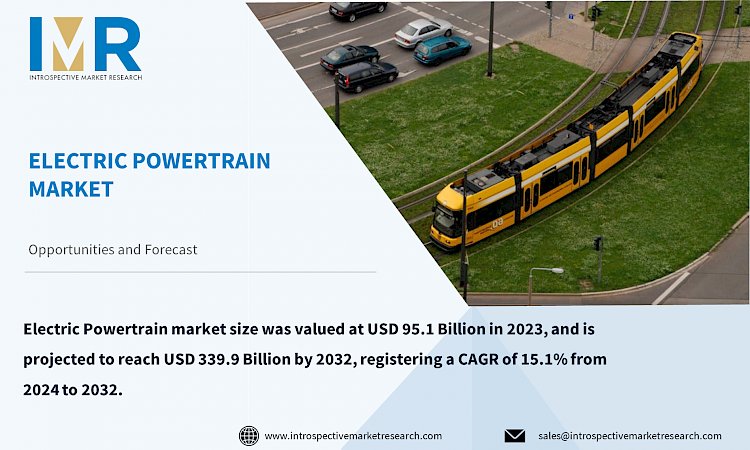Electric Powertrain Market
According to a new report published by Introspective Market Research, titled, ?Electric Powertrain Market by Electric Vehicle and Component: Global Opportunity Analysis and Industry Forecast, 2024?2032,?
the global Electric Powertrain market size was valued at USD 95.1 Billion in 2023, and is projected to reach USD 339.9 Billion by 2032, registering a CAGR of 15.1% from 2024 to 2032.
Electric vehicles (EVs) transform electrical energy into mechanical energy, enabling quiet and sustainable transportation. The electric powertrain market is expanding due to increasing global demand, supportive government policies, and improvements in battery costs and charging infrastructure. Nonetheless, challenges such as range limitations, charging station availability, and battery sustainability persist. Collaboration among automotive industry players, governments, and stakeholders is essential to stabilize the market. Despite these hurdles, the future of electric powertrains looks promising, with EVs poised to become a cornerstone of modern mobility.
According to The Electric Powertrain Market is segmented into Vehicles, Components, and Region. By Vehicle, the market is categorized into BEV, HEV/PHEV. By Component, the market is categorized into Motor/Generator, Battery, Power Electronics Controller, Converter, Transmission, and On-Board Charger. By region, it is analyzed across North America (U.S.; Canada; Mexico), Eastern Europe (Bulgaria; The Czech Republic; Hungary; Poland; Romania; Rest of Eastern Europe), Western Europe (Germany; UK; France; Netherlands; Italy; Russia; Spain; Rest of Western Europe), Asia-Pacific (China; India; Japan; Southeast Asia, etc.), South America (Brazil; Argentina, etc.), Middle East & Africa (Saudi Arabia; South Africa, etc.).
Solid-state batteries are attracting interest for their higher energy density, faster charging times, improved safety, and extended lifespan compared to conventional lithium-ion batteries. These advantages enhance the performance and sustainability of electric vehicles by addressing issues such as range anxiety and battery degradation. Ongoing research and development will ensure that solid-state batteries significantly influence the advancement of electric powertrains and the broader electric vehicle market.
The rise in electric vehicles (EVs) stems from heightened environmental awareness and the need for efficient transportation solutions. This growth offers electric powertrain manufacturers opportunities to innovate and create new systems for emerging markets. Electric buses and trucks promise to cut emissions and costs, while electric air taxi initiatives target greener and quieter aviation.
Global Electric Powertrain Market, Segmentation
The Electric Powertrain market is segmented based on Electric Vehicle and Component, and Region.
Vehicle:
The Battery Electric Vehicle (BEV) segment is anticipated to lead the electric powertrain market, driven by increasing environmental awareness, stringent emission regulations, and advancements in battery technology. BEVs, which do not rely on internal combustion engines or fossil fuels, support global initiatives to lower greenhouse gas emissions. With automakers heavily investing in BEV production and governments providing subsidies, BEVs are poised to dominate the market.
Component:
The motor/generator segment is projected to lead the electric powertrain market, serving as the primary propulsion source in electric vehicles. These components provide rotary power for movement and enable regenerative braking, converting kinetic energy into battery charge. The evolution of electric vehicles has spurred the need for compact, lightweight, and energy-efficient motors and generators. Technological advancements have enhanced the efficiency of DC motors in terms of power output and range, ensuring the motor/generator segment maintains its market dominance.
Region:
The Asia Pacific region is predicted to become the leading market for electric powertrains in the future, with China, Japan, and South Korea being key players due to their robust automobile industries, technological advancements, and supportive government policies. China is emerging as the largest global market for EVs due to climate change mitigation goals and a shift away from fossil fuels. Japan and South Korea are heavily investing in electric powertrain research to stay competitive. The growing middle class in these countries is seeking improved transportation methods, leading to increased demand for electric vehicles.
Some of The Leading/Active Market Players Are-
- BorgWarner (United States)
- Bosch Limited (Germany)
- Mitsubishi Electric Corp (Japan)
- Magna International Inc. (Canada)
- Schaeffler AG (Germany)
- ZF Friedrichshafen AG (Germany)
- Valeo (France)
- Nidec Corporation (Japan)
- Continental AG (Germany)
- Magneti Marelli Ck Holdings (Italy), and Other Active Players
Key Industry Developments
- In April 2023, Denso Corporation (Denso) introduced its inaugural inverter featuring silicon carbide (SiC) power semiconductors. This inverter is slated for integration into the eAxle developed by BlueE Nexus Corporation, which will be installed in the Lexus RZ.
- In February 2023, Continental AG launched a new electric motor rotor position sensor (eRPS) designed for electric vehicles. The eRPS utilizes inductive technology to accurately detect the position of synchronous electric machine rotors, leading to enhanced efficiency and smoother operational performance.
Key Findings of the Study
- The global electric powertrain market is projected to grow from USD 95.1 billion in 2023 to USD 339.9 billion by 2032, driven by rising demand, favorable government policies, and advancements in battery technology.
- Solid-state batteries are gaining popularity due to their higher energy density, faster charging times, improved safety, and extended lifespan, which are crucial for enhancing electric vehicle performance and sustainability
- The BEV market is predicted to be dominated by the BEV segment due to environmental awareness, strict emission regulations, and technological advancements in the motor/generator segment.
- The Asia Pacific region, particularly China, Japan, and South Korea are expected to dominate the electric powertrain market due to their robust automobile industries, technological advancements, and government policies promoting climate change mitigation.






